- Home
- Francine Rivers
Her Daughter's Dream
Her Daughter's Dream Read online
Visit Tyndale’s exciting Web site at www.tyndale.com.
Check out the latest about Francine Rivers at www.francinerivers.com.
TYNDALE and Tyndale’s quill logo are registered trademarks of Tyndale House Publishers, Inc.
Her Daughter’s Dream
a cognizant original v5 release november 24 2010
Copyright © 2010 by Francine Rivers. All rights reserved.
Cover illustration copyright © 2010 by Robert Papp. All rights reserved.
Cover photo of woman copyright © Konstantin Igoshev/iStock. All rights reserved.
Cover photo of woman copyright © Michele Princigalli/iStock. All rights reserved.
Interior photos of author’s family used by permission from the Rivers family collection.
Author photo copyright © 2003 by Phil Fewsmith. All rights reserved.
Designed by Beth Sparkman
Edited by Kathryn S. Olson
Published in association with the literacy agency of Browne and Miller Literary Associates, LLC, 410 Michigan Avenue, Suite 460, Chicago, IL 60605.
Unless otherwise indicated, Scripture quotations are taken from the New American Standard Bible,® copyright © 1960, 1962, 1963, 1968, 1971, 1972, 1973, 1975, 1977, 1995 by The Lockman Foundation. Used by permission.
Scripture quotations in chapter 41 are taken from the Holy Bible, New Living Translation, copyright © 1996, 2004, 2007 by Tyndale House Foundation. Used by permission of Tyndale House Publishers, Inc., Carol Stream, Illinois 60188. All rights reserved.
This novel is a work of fiction. Names, characters, places, and incidents either are the product of the author’s imagination or are used fictitiously. Any resemblance to actual events, locales, organizations, or persons living or dead is entirely coincidental and beyond the intent of either the author or the publisher.
Library of Congress Cataloging-in-Publication Data
Rivers, Francine, date.
Her daughter’s dream / Francine Rivers.
p. cm. — (Marta’s legacy ; 2)
ISBN 978-1-4143-3409-7
1. Mothers and daughters—Fiction. 2. Self-actualization (Psychology) in women—Fiction. 3. Domestic fiction. I. Title.
PS3568.I83165H46 2010
813´.54—dc22 2010020821
ISBN 978-1-4143-3684-8 (International Trade Paper Edition)
For Jenny and Savannah
Acknowledgments
Most of the novel you are about to read is purely fictional, though there are bits and pieces of personal family history woven throughout. The manuscript has taken various forms over the last two years, and in the end morphed into a saga. Many people have helped me in the process of writing the stories of Marta and Hildemara in the first volume and Carolyn and May Flower Dawn in the second. I want to thank each and every one of them.
First of all my husband, Rick, has ridden the storm through this one, listening to every variation of the stories as the characters took form in my imagination and acting as my first editor.
Every family needs a historian, and my brother, Everett, has played that role to perfection. He sent me hundreds of family pictures that helped flesh out the story. I also received invaluable help from my cousin Maureen Rosiere, who described in detail our grandparents’ almond and wine-grape ranch, a pattern I used in this novel. Both my husband and my brother shared their Vietnam experiences with me.
Kitty Briggs, Shannon Coibion (our daughter), and Holly Harder shared their experiences as military wives. Holly has been a constant help to me. I know of no other person on the planet who can find information on the Internet faster! Whenever I ran into a wall, Holly tore it down. Thanks, Holly!
Holly’s son, U.S. Army Lieutenant Daniel Harder, gave me information on the engineering and ROTC programs at Cal Poly. He is now on active duty. Our prayers are with him.
Ila Vorderbrueggen, a nurse and personal friend of my mother’s, helped me fill in information about long-term patient care in the Arroyo del Valle Sanatorium. I’ve enjoyed our correspondence.
Kurt Thiel and Robert Schwinn answered questions about InterVarsity Christian Fellowship. Keep up the good work, gentlemen!
Globus tour guide Joppy Wissink rerouted a bus so that Rick and I had the opportunity to walk around my grandmother’s hometown of Steffisburg, Switzerland.
All along the course of this project, I have had brainstorming partners when I needed them. Colleen Phillips raised questions and encouraged me from the beginning. Robin Lee Hatcher and Sunni Jeffers jumped in with ideas and questions when I didn’t know which way to go. My agent, Danielle Egan-Miller, and her associate, Joanna MacKenzie, helped me see how to restructure the novel to show the story I wanted to tell.
I would also like to thank Karen Watson of Tyndale House Publishers for her insights and encouraging support. She helped me see my characters more clearly. And, of course, every writer needs a good editor. I am blessed with one of the best, Kathy Olson. She makes revision work exciting and challenging rather than painful.
Finally, I thank the Lord for my mother and grandmother. Their lives and Mom’s journals first inspired the idea of writing about mother-daughter relationships. They were both hardworking women of faith. They both passed on some years ago, but I cling to the promise that they are still very much alive and undoubtedly enjoying one another’s company. One day I will see them again.
Prologue
January 1951
Dear Rosie,
Trip called. Hildemara is back in the hospital. She had been there for nearly two months before they got around to telling me about it. But now they want my help. My sweet Hildemara Rose, the smallest, the weakest, the most dependent of my children. She has struggled from the beginning. And now, somehow, I must find a way to give her the courage for one more struggle.
I didn’t always see it, but recently the Lord has reminded me of all the times Hildemara’s courage and spunk have served her well. She chose her own path in life and pursued it against all odds (and against my advice, I might add!). She followed that husband of hers from one military base to another, finding apartments in strange cities, making new friends. She crossed the country by herself and came home to help Bernhard and Elizabeth hold on to the Musashis’ land, despite threats and fire and bricks through their windows.
And I needn’t remind you of her response when faced with the same kind of abuse that our dear Elise succumbed to so many years ago. She was smart enough to run. My daughter has courage!
I have been forced to admit that I have always favored Hildemara a little above the others. (Is any of this news to you, my dear friend? I suspect you know me better than I know myself.) From the moment my first daughter came into the world, she has held a special place in my heart. Niclas always said she looked like me, and I’m afraid it’s true. And we both know how little regard my father had for my plain looks. And like Elise, she was frail.
How could a mother’s heart fail to respond to such a combination? I did what I felt I had to do. From the start I determined that I would not cripple Hildemara Rose the way Mama crippled Elise. But now I wonder if I did the right thing. Did I push her too hard and, in so doing, push her away? She wouldn’t even let her husband call me for help until they both thought she was past the point of no return. I wish now I’d been more like my mother, with her gracious and loving spirit, and less like my father. Yes, that’s right. I see clearly that I inherited some of his selfish and cruel ways. Don’t try to convince me otherwise, Rosie. We both know it’s true.
Now my hope and prayer is that I can bring Hildemara close again. I am praying for more time. I want Hildemara to know how much I love her, how proud I am of her and her accomplishments. I want to mend my relationship with her. I want to learn ho
w to serve my daughter. I, who have rebelled all my life at the very thought of servanthood.
I started thinking about Lady Daisy and our afternoons at Kew and tea in the conservatory. I think it’s about time I shared some of these experiences with Hildemara Rose. . . . I will make all the wonderful sweets and savories for Hildemara Rose that I once served to Lady Daisy. I will pour India tea and lace it with cream and conversation.
God willing, I will win back my daughter.
Your loving friend,
Marta
Hildemara Rose
1
Hildemara lay in the darkness, her nightgown damp with perspiration. Night sweats again—she should be used to them by now. Her roommate, Lydia, snored softly. Lydia had been steadily improving since she arrived six weeks ago, which only served to depress Hildemara more. Lydia had gained two pounds; Hildie lost the same amount.
Two months and still no improvement, hospital bills mounting daily, crushing Trip’s dreams beneath their weight. Her husband came each afternoon. He’d looked so tired yesterday, and no wonder when he had to work full-time and then go home and take care of all her duties: laundry, cooking, seeing to Charlie’s and Carolyn’s needs. Hildie grieved over her children—Charlie on his own so much of the time, Carolyn being raised by an indifferent babysitter. She hadn’t touched or seen her children since Trip brought her to the hospital. She missed them so much, she felt physical pain most of the time. Or was that just the mycobacterium tuberculosis consuming her lungs and decimating her body?
Pushing the covers back, Hildie went to the bathroom to rinse her face with cool water. Who was that gaunt, pale ghost staring back at her in the mirror? She studied the sharp angles, the pallor, the shadows beneath her hazel eyes, the lackluster brown color of the hair around her shoulders.
I’m dying, Lord, aren’t I? I haven’t enough strength to fight this disease. And now I have to face Mama’s disappointment in me. She called me a coward last time. Maybe I am giving up. She cupped water in her hands and pressed her face into it. Oh, God, I love Trip so much. And Charlie and sweet little Carolyn. But I’m tired, Lord, so very tired. I’d rather die now, than linger and leave a legacy of debt.
She’d told Trip as much last week. She only wished she could die at home, rather than in a sterile hospital room twenty miles away. His face had twisted in anguish. “Don’t say that. You’re not going to die. You have to stop worrying about the bills. If your mother came, I could bring you home. Maybe then . . .”
She’d argued. Mama wouldn’t come. She’d never helped before. Mama hated the very idea of being a servant. And that’s exactly what she’d be—a full-time maid and washerwoman, babysitter and cook, without pay. Hildie said she couldn’t ask such a thing of Mama.
Trip called Mama anyway, and then he went down on Saturday with Charlie and Carolyn so he and Mama could talk things over. He’d come out this morning. “Your mother said yes. I’m taking a couple of days off to get things ready for her.” He wanted to repaint Carolyn’s room, buy a nice, comfortable bed, a new dresser and mirror, maybe a rocking chair. “Charlie and Carolyn will have the small bedroom. You and I’ll be together. . . .”
“I can’t sleep with you, Trip. I need to be quarantined.” She could barely absorb the news that Mama had agreed to help. “I can’t be near the children.” At least, she could hear them; she could see them. Mama said she’d come. Mama was moving in. Hildie trembled, taking it all in. She felt a little sick to her stomach. “I’ll need a hospital bed.” She gave Trip instructions about her room. No rug. A window shade rather than curtains. The simpler the room, the easier to keep sanitized. Trip looked so hopeful, it broke her heart. He leaned down to kiss her forehead before he left. “You’ll be home soon.”
Now, she couldn’t sleep. Rather than get back into bed, Hildie sat in a chair by the window and looked out at the stars. What was it going to be like, having Mama living under her roof, taking care of her, taking care of her children, taking care of all the chores that needed to be done so Trip didn’t have to do everything? Would Mama despise her for not fighting harder? Her eyes burned; her throat ached just thinking about having to lie in bed sick and helpless while Mama took over her family. She wiped tears away. Of course, Mama would do it all better than she ever could. That realization hurt even more. Mama had always managed everything. Even without Papa, the ranch ran like a well-oiled machine. Mama would fix Trip wonderful meals. Mama would be the one to give Charlie wings. Mama would probably have Carolyn reading before she turned four.
I should be grateful. She cares enough to come and help. I didn’t think she did.
When the night air had cooled her, Hildie slipped beneath the covers again.
She wanted to be grateful. She would say thank you, even as she had to watch the life she loved slip away from her. She had fought hard to be free of Mama’s expectations, to claim her own life and not live out her mother’s impossible dreams. Even the one thing at which she’d excelled would be stripped from her before she closed her eyes for the last time.
Mama would be the nurse. Mama would carry the lantern.
Carolyn
2
Carolyn was happy that Daddy let her stay with Oma Marta in Murietta until Oma was ready to move to their house. If she had gone home with him and Charlie, she would have had to go to Mrs. Haversal’s across the street every day while Charlie was at school and Daddy went to work. It had been like that for a long time, ever since Mommy went away. But now, Mommy was coming home and Oma was coming to stay. It would be wonderful!
Carolyn played with the rag doll Oma had given her, while Oma packed her suitcase with clothing and a trunk with sheets, crochet-trimmed and embroidered pillowcases, two blankets, and a pink rose tea set with tiny silver spoons. Oma put the suitcase and trunk in the back of her new gray Plymouth, and then she stacked two cushions in the front seat so Carolyn could sit high up and see out the window on the long drive home. Oma even let her roll her window down so she could put her hand out and feel the air.
They pulled into the driveway just when Charlie got off the school bus. “Oma!” He came running. Oma took the front door key out from under the flowerpot on the front porch.
Everything had changed inside the house. Carolyn found her bed and dresser in Charlie’s room.
A small table stood between Charlie’s bed and hers. She went back to her old room and watched Oma swing her suitcase onto a new, bigger bed. The pink walls were now bright yellow, and new lacy white curtains hung over the windows. There was a big dresser with a mirror on top, a little table and lamp, and a rocking chair with flowered cushions.
“I’m going to be very comfortable here.” Oma unpacked her clothes and put them away.
Oma stepped to the window and drew the white lacy curtains aside. “I’m going to have to get used to having neighbors this close.” She shook her head and turned away. “I’d better get dinner started. Your daddy will be coming home soon.”
“Is Mommy coming home?”
“In another day or two.” Oma opened the door into the spare bedroom. “This is where she’ll be.” Leaving Carolyn in the bedroom doorway, Oma headed for the kitchen. Carolyn didn’t like the room. It felt cold and strange without a rug on the floor and no curtains on the window, just a shade pulled down to block out the sunlight.
Carolyn came into the kitchen. “Mommy isn’t going to like her room.”
“It’s exactly the way she wants it. Easy to keep clean.”
“Mommy likes plants on the windowsill. She likes flowers in a vase.” Mommy always had pictures in frames on her dresser.
“Mommy doesn’t like germs.” Oma peeled potatoes.
“What are germs?”
Oma chuckled. “You’ll have to ask your mother.”
Oma had dinner ready before Daddy came home from work. They all sat around the kitchen table. “When do you pick her up?” Oma set a pitcher of milk on the table and sat in Mommy’s chair.
“Day after tomorr
ow.”
“Plenty to be thankful for, haven’t we?” When Oma stretched out her hands, Charlie took one and Carolyn the other. Daddy took their hands too so they made a circle. He hadn’t said grace since Mommy went away. He spoke quietly now, calmly, said amen and sighed, a smile tugging at his lips. Oma asked questions about his work, and Daddy talked for a long time. When everyone had finished dinner, Daddy stacked the dishes, but Oma shooed him away. “You and the kids go visit or play or whatever you normally do. I’ll take care of cleaning up.”
Daddy took Charlie outside to play catch. Carolyn sat on the front steps and watched.
Oma handled the baths that night, Charlie first so he could do his homework. She sat on the closed toilet while Carolyn played in the bubble bath. Oma gave Daddy a book to read to them, with Carolyn on one side and Charlie on the other. When he finished, he kissed them both and sent them to bed. Oma tucked them in with prayers.
In the middle of the night, Carolyn awakened. She’d gotten used to sleeping with Oma. Charlie didn’t have monsters in his room, but Carolyn worried about Oma. Crawling out of bed, she crept down the hall to her old bedroom and opened the door. Oma snored so loudly, she’d probably scared all the monsters out of the house with the noise she made. Scampering back to Charlie’s room, Carolyn dove into bed. Snuggling down into the covers, she looked at Charlie sleeping on the other side of the room, thought of Mommy coming home, and went to sleep smiling.
* * *
Daddy left for work right after a breakfast of scrambled eggs, bacon, and fresh-baked biscuits. As soon as Charlie left for school, Oma tipped Carolyn’s chin. “Let’s go brush your hair and put it in a ponytail. What do you say?” She took Carolyn by the hand and led her into her bedroom. She patted the bed and Carolyn climbed up onto it. While Oma brushed her hair, Carolyn watched her grandmother in the mirror. She liked her white hair and tanned, wrinkled cheeks. She had warm green-brown eyes like Mommy’s. Oma smiled back at her. She brushed Carolyn’s long, curly blonde hair into her hand. “You look like Elise. She was my little sister, and she was very, very pretty, just like you.” When all the tangles had been worked out, Oma wound a rubber band around Carolyn’s hair. “There. That looks better. Don’t you think?”

 An Echo in the Darkness
An Echo in the Darkness A Lineage of Grace
A Lineage of Grace The Prince: Jonathan
The Prince: Jonathan Bridge to Haven
Bridge to Haven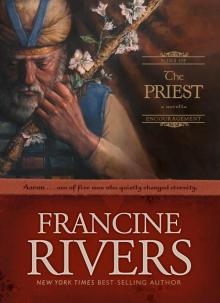 The Priest: Aaron
The Priest: Aaron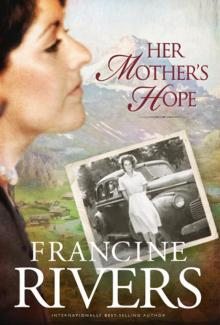 Her Mother's Hope
Her Mother's Hope Redeeming Love
Redeeming Love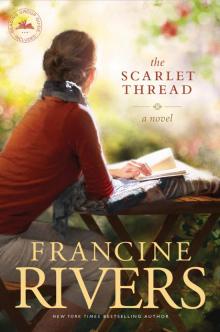 The Scarlet Thread
The Scarlet Thread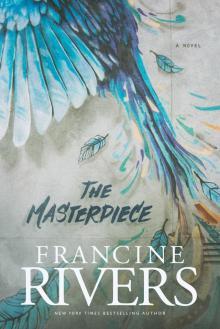 The Masterpiece
The Masterpiece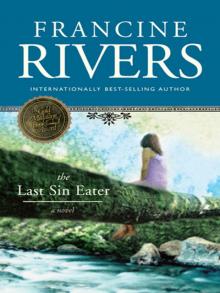 The Last Sin Eater
The Last Sin Eater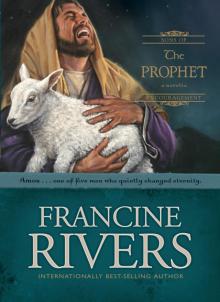 The Prophet: Amos
The Prophet: Amos As Sure as the Dawn
As Sure as the Dawn Her Daughter's Dream
Her Daughter's Dream A Voice in the Wind
A Voice in the Wind The Warrior: Caleb
The Warrior: Caleb The Scribe: Silas
The Scribe: Silas And the Shofar Blew
And the Shofar Blew The Atonement Child
The Atonement Child Unshaken_Ruth
Unshaken_Ruth Unspoken_Bathsheba
Unspoken_Bathsheba The Scribe
The Scribe Sons of Encouragement
Sons of Encouragement The Shoe Box
The Shoe Box Sycamore Hill
Sycamore Hill Unafraid_Mary
Unafraid_Mary Marta's Legacy Collection
Marta's Legacy Collection